Hard gelatin capsules consist of two rigid parts, making them ideal for containing dry powders or pellets, while soft gelatin capsules are flexible and typically used for oils and liquid contents, offering better bioavailability. Understanding the differences can help you choose the appropriate capsule type based on the nature of your formulation and desired release profile.
Table of Comparison
| Feature | Hard Gelatin Capsule | Soft Gelatin Capsule |
|---|---|---|
| Composition | Gelatin shell with separate two-piece design | Gelatin shell with one-piece, flexible design |
| Filling | Dry powders, granules, pellets | Oils, liquids, semi-solids |
| Manufacturing | Two-piece encapsulation process | One-piece soft gelatin molding |
| Stability | Good moisture barrier; less sensitive to moisture | More moisture sensitive; requires controlled humidity |
| Dosage Accuracy | High, uniform powder fill | High, liquid fill precision |
| Bioavailability | Variable; dependent on powder dissolution | Generally higher; rapid release of liquid drugs |
| Flexibility | Limited, rigid capsule | Flexible, soft and easy to swallow |
| Cost | Lower manufacturing cost | Higher due to complex processing |
| Applications | Oral solid formulations, nutraceuticals | Oral liquid formulations, oily drugs, vitamins |
Introduction to Gelatin Capsules
Gelatin capsules are widely used in pharmaceutical and nutraceutical industries to encapsulate powders, liquids, and semi-solids, offering a convenient and stable delivery method. Hard gelatin capsules consist of two separate pieces that fit together and are primarily used for dry, powdered ingredients, providing excellent protection from moisture and light. Soft gelatin capsules, made from a single, seamless shell, are ideal for oils and liquid formulations, ensuring enhanced bioavailability and ease of swallowing.
What are Hard Gelatin Capsules?
Hard gelatin capsules are solid dosage forms made from gelatin derived primarily from bovine or porcine sources, designed to encase powdered or granulated medications. They consist of two separate cylindrical halves, a body and a cap, which fit together to protect the contents from moisture and contamination. Widely used in pharmaceutical and nutraceutical industries, hard gelatin capsules offer precision dosing, ease of swallowing, and modification possibilities such as enteric coating or controlled-release formulations.
What are Soft Gelatin Capsules?
Soft gelatin capsules are a specialized dosage form made from a flexible, soft shell primarily composed of gelatin, plasticizers, and water, designed to encapsulate liquids, oils, or suspensions. These capsules offer superior bioavailability and ease of swallowing compared to hard gelatin capsules, making them ideal for delivering highly concentrated or sensitive ingredients such as vitamins, omega-3 fatty acids, and herbal extracts. You can benefit from soft gelatin capsules' enhanced stability and airtight seal, which protect the contents from oxidation and moisture.
Composition Differences
Hard gelatin capsules consist of two rigid shells made primarily from gelatin, water, and sugar, designed to encapsulate powdered or granular substances. Soft gelatin capsules contain a single flexible shell composed of gelatin combined with plasticizers like glycerin or sorbitol, allowing them to hold liquid or semi-liquid ingredients. Your choice between these capsules depends on the formulation requirements and the desired release properties of the active compounds.
Manufacturing Process Comparison
Hard gelatin capsules are produced by dipping stainless steel pins into a gelatin solution, followed by drying, stripping, trimming, and joining two capsule halves, ensuring precise control over capsule size and thickness. Soft gelatin capsules involve a more complex rotary die process that encapsulates liquid or semi-solid fills within a continuous gelatin ribbon, requiring stringent control of temperature and humidity to maintain capsule integrity. The manufacturing of hard capsules allows for simpler filling of powders or pellets, while soft capsules are preferred for encapsulating oils and viscous substances, highlighting differences in formulation compatibility and production equipment.
Physical Appearance and Structure
Hard gelatin capsules consist of two rigid cylindrical halves, typically opaque or clear, designed to hold powdered or granular contents with a distinct seam where the halves join. Soft gelatin capsules feature a one-piece, flexible, and often smooth shell with a uniform, sealed surface ideal for encapsulating liquid or semi-solid substances. Understanding these structural differences helps you select the appropriate capsule type based on your formulation requirements and desired visual presentation.
Drug Encapsulation Capabilities
Hard gelatin capsules offer superior protection for dry, powdered drugs and allow separate encapsulation of incompatible ingredients, enhancing stability and precise dosing. Soft gelatin capsules excel in encapsulating liquid and semi-solid formulations, improving bioavailability for poorly soluble drugs through enhanced dissolution rates. Both types demonstrate distinct drug encapsulation capabilities tailored to specific pharmaceutical formulations and therapeutic requirements.
Applications and Uses in Pharmaceuticals
Hard gelatin capsules are primarily used for dry powder and pellet formulations, offering precise dosing and protection of sensitive ingredients, making them ideal for vitamins, antibiotics, and probiotics. Soft gelatin capsules excel in delivering liquid or semi-solid formulations, enhancing bioavailability of oil-based drugs, and are commonly employed for omega-3 fatty acids, cannabinoids, and fat-soluble vitamins. Your choice between hard and soft gelatin capsules depends on the drug's physical state and desired absorption characteristics in pharmaceutical applications.
Stability and Storage Requirements
Hard gelatin capsules exhibit superior stability due to their lower moisture content, allowing for longer shelf life under standard storage conditions. Soft gelatin capsules require more controlled environments with specific humidity and temperature ranges to prevent capsule deformation and ingredient degradation. Your choice depends on storage capabilities and the stability needs of the encapsulated substance.
Advantages and Disadvantages
Hard gelatin capsules offer precise dosage control and better stability for dry powdered drugs, making them ideal for medications requiring delayed release; however, they are less flexible and can be prone to moisture absorption. Soft gelatin capsules provide superior bioavailability for liquid or oil-based formulations and are easier to swallow due to their smooth texture, but they have a shorter shelf life and require more complex manufacturing processes. Your choice between the two depends on the drug formulation and desired release profile, balancing ease of administration with stability needs.
Hard gelatin capsule vs soft gelatin capsule Infographic

 libmatt.com
libmatt.com